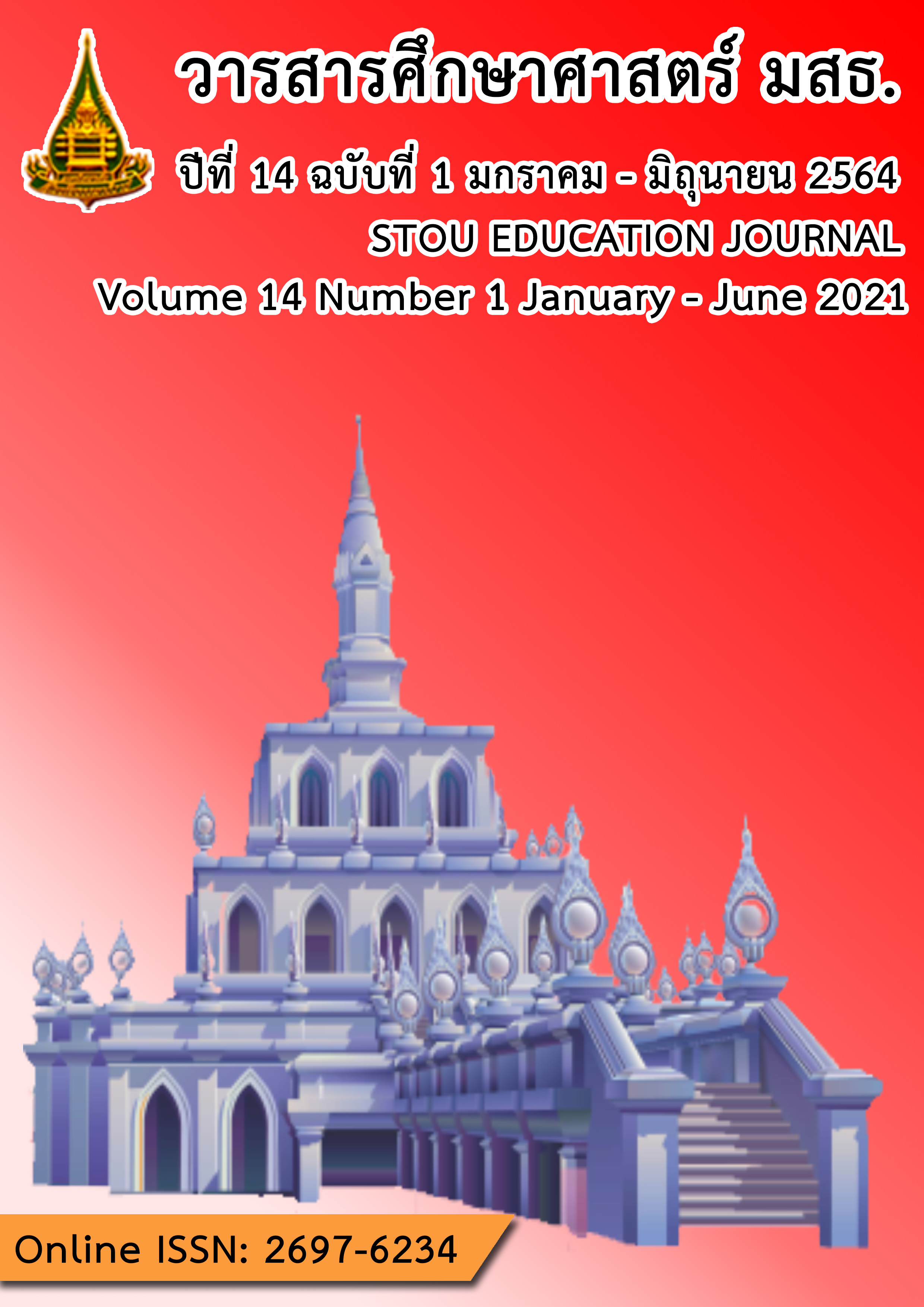The Effects of Inquiry-Based Learning on Students’ Mathematics Achievement and Math Anxiety
Main Article Content
Abstract
This study was a classroom action research. The research objectives aimed to enhance students’ mathematics achievement by using inquiry-based learning and to investigate the effect of inquiry-based learning on levels of students’ math anxiety . The sample consisted of 31 Grade 12 students who enrolled in the first semester of the academic year 2019 at a secondary school in Bangkok Metropolis, Thailand. The research instruments consisted of eight lesson plans covering 12 learning periods on the topic of Limits and Continuity of Functions, pre-test, post-test, and math anxiety questionnaire. The results of this research indicated that the effectiveness concerning students’ achievement after being instructed had an Effectiveness Index (E.I.) of 0.7689 which means that the students’ learning achievement had been developed by 76.89% based on prior knowledge. In addition, the post-test scores were statistically significantly higher than pre-test scores at the .05 level. As for students’ opinions towards the instruction that affected their math anxiety level in learning mathematics, it was found that the students' opinions on teaching that affect the level of anxiety in mathematics learning were: “very high” (6.45%), “high” (25.81%), “low” (48.39%), and “very low” (19.35%).
Article Details
References
Battista, M.T. (2007). The development of geometric and spatial thinking. In F.K. Lester (Ed.), Second handbook of research on mathematics teaching and learning. pp. 843-908. Charlotte, NC: Information Age.
Beilock, S.L., & Willingham, D.T. (2014). Math anxiety: Can teachers help students reduce it? Ask the cognitive scientist. American Educator, 38(2), 28-32.
Bruce, B.C., & Bishop, A.P. (2002). Using the web to support inquiry-based literacy development. Journal of Adolescent & Adult Literacy, 45(8), 706-714.
Bruce, B.C., & Davidson, J. (1996). An inquiry model for literacy across the curriculum. Journal of Curriculum Studies. 28(3), 281-300.
Freedman, E. (2017). Math Anxiety Test, Retrieved from http://www.mathpower.com/anxtest.htm
Government of Ontario. (2011). Asking effective questions in mathematics. Retrieved from http://www.edu.gov.on.ca/eng /literacynumeracy/inspire
Guido, M. (2017, May). Inquiry-based learning definition, benefit & strategies, Retrieved from https://www.prodigygame .com/ blog/inquiry-based-learning-definition-benefits-strategies/
Kidrakan, P. (2002). ดัชนีประสิทธิผล[Effectiveness Index: E.I.]. Journal of Educational Measurement Mahasarakham University, 8(13), 30-36.
Kim, G. (2017). Inquiry-based learning revisited: A case study of an experienced elementary mathematics teacher in action (Doctoral dissertation). Retrieved from ProQuest Digital Dissertations. (UMI 10265947)
Kaur, R. (2019, May 1). Enhancing motivation and engagement in math classrooms using inquiry-based learning. Retrieved from https://doi.org/10.31235/osf.io/9n5tv
Lightfoot, K. (2018). Teachers’ perceptions of inquiry-based learning in middle grades mathematics (Doctoral dissertation). Retrieved from ProQuest Digital Dissertations. (UMI 10784762)
Ministry of Education. (2008). The basic education core curriculum B.E. 2551 (A.D. 2008). Bangkok: Kurusapa Ladprao Publishing.
Nasrollahi, M.A. (2015). A closer look at using Stringer’s action research model in improving students’ learning. International Journal of Current Research, 7(7), 18663-18668.
National Council of Teachers of Mathematics (NCTM). (1991). Professional standards for teaching mathematics. Reston, VA: National Council of Teachers of Mathematics.
Santos, J.S., & Boyon, M. (2020). Effect of Inquiry-based lessons on STEM student’s learning competencies on limits and continuity. International Journal of Social Science, 5(2), 782-792.
Scardamalia, M. (2002). Collective cognitive responsibility for the advancement of knowledge. In B. Smith (Ed.), Liberal Education in a Knowledge Society, pp. 67–98. Chicago, IL: Open Court.
Siregar, E., & Siregar, S.R. (2019) Inquiry learning strategy to improve mathematics achievement of junior high school. Journal of Physics: Conference Series, doi : 10.1088/1742-6596/1188/
Stringer, E. (2007). Action research (3rd ed.). Thousand Oaks, California: Sage Publications.
Wathall, J.C. (2017, December). What does 21st Century math learning look like? Eight Engaging Strategies for the Math Classroom. Retrieved from https://www.jenniferchangwathall.com/single-post/2017/12/18/what-does-21st-century-math-learning-look-like-eight-engaging-strategies-for-the-math-cla
Watanabe-Crockett, L. (2017). These Bloom’s analysis tools are perfect for higher-order thinking. Retrieved from https://globaldigitalcitizen.org/blooms-analysis-tools/amp


